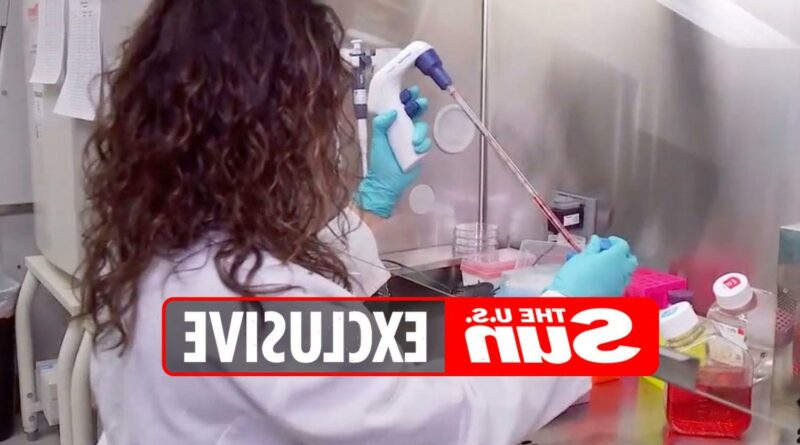Inside lab where you can clone your pet for $50,000 – as experts reveal why demand is spiking
A US company that clones cats and dogs has a "huge waiting list" after interest spiked during Covid.
ViaGen has been "extremely successful" cloning cats and dogs since 2015, said Lauren Aston, who's part of the company's marketing department.
Right now, it costs $35,000 to clone a cat and $50,000 to clone a dog.
"Your veteranarian does a skin biopsy, which is a non-invasive procedure like mole removal, and sends the sample to our Cedar Park, Texas lab, where we grow the cell and freeze it," Aston told The Sun.
The best time to get the DNA sample is during a routine procedure like a spay, neuter or dental cleaning, she said, but the process can be done within five days of the pet's death.
The frozen DNA sample is stored in ViaGen Pets cryostorage facility to be processed and preserved.
READ MORE CAT STORIES
I paid £19k to clone my cat – but my new pet is completely different
Optical illusion of cat reveals whether you are an optimist or a pessimist
THE BOOMING CLONING MARKET
ReportMines, which recently released a sample report analyzing the animal cloning market, said the pandemic jump started the market.
By 2028, it's expected to be worth multiple millions, according to ReportMines' report.
To get an exact number, ReportMines requires the purchase of its full report and declined to be interviewed.
Most read in The Sun
PAIN IN THE NECK Moment protester ties his NECK to post at Everton and has to be cut free
Lewis Hamilton doubts Mercedes' F1 title challenge just days before new season
Ian Wright launches X-rated defence of Rashford after confrontation with fans
CL quarter-final draw simulated as Chelsea land Real and Liverpool get City
THE PROCESS EXPLAINED
When the owner is ready to clone the pet, the ViaGen technician replaces the nucleus of a donor egg with one of the founder’s frozen cells and uses the patented treatment to produce an embryo, she said.
The embryo is implanted into a surrogate, which gives birth like a typical cat or dog and then given to the new owner after it's weaned from the mother.
"You are going to get 100 percent genetic twin," Aston said.
But external factors – such as diet, how many pets are in the home, children, among others – may change the pet's personality.
"There’s so much that goes into personality. It's nature and nurture," Aston said. "Parents have multiple children, and the second and third child is different from their first one. It's no different with pets.
Kelly Anderson, who cloned her cat, said in a previous interview that Chai and her cloned cat Belle are "are completely different."
"They have some baseline personalities that are a little similar. Like they're very bold, sassy, cats, but that could be the breed," Anderson said. "But Belle is a totally new cat."
ANSWERING CLONING CONTROVERSIES
Cloning pets is relatively new and very controversial.
Opponents argue against cloning and say to adopt a pet from a shelter. Other opponents compare cloning to a high-tech puppy mill.
There isn't a regulated number of times a surrogate can be used, but Aston said ViaGen internally limits the number of times a surrogate can be used to two.
"This is a very niche market. This isn’t going to be for the masses from ethical to financial reasons," Aston said.
"What's different is every dog, cat and horse were specifically requested. Every client has a unique reason and unique story."
THE FUTURE OF ANIMAL CLONING
Animal cloning technology has advanced since Dolly the sheep was cloned in 1996.
As the technology improves, prices will eventually decline, Aston said.
"That's not going to happen happen. That's five years, 10 years down the road," she said. "But it’s really about the technology evolving as with all things like iPhone.
"I would say the future is cloning for conservation efforts."
ViaGen is working with the US Fish and Wildlife Service, Revive & Restore to successfully clone a black-footed ferret, an endangered species with only about 300 left in the wild.
Read More on The US Sun
Are you a ‘dark empath’? Scientists reveal NEW ‘dangerous’ personality type
Khloe Kardashian shocks fans with her slimmed-down figure in leather look
The animal cloning leader is also working with the San Diego Zoo to clone the Przewalski Horse, an endangered species with about 1,900 left in the wild and captivity.
"That is where we will see our new exciting ventures," Aston said. "Zoos have frozen genetic zoos. They were forward-thinking in that way. But now the technology exists to clone and save a species."
We pay for your stories!
Do you have a story for The US Sun team?
Email us at [email protected] or call 212 416 4552.
Like us on Facebook at www.facebook.com/TheSunUS and follow us from our main Twitter account at @TheSunUS
Source: Read Full Article














